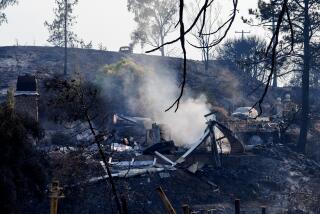L.A. Planning Director Says He Will Retire
Continuing the trend of turnover in top management at City Hall, Los Angeles Planning Director Con Howe announced his retirement Wednesday after months of clashing with council members and neighborhood leaders over conflicting visions for development.
Howe is the 12th department head to have given notice this year. The planning director said he would end his 12 years with the city early next year after a national search finds a permanent replacement. With 30 years of civil service, including stints in New York City and Boston, Howe, 55, is eligible for full retirement benefits next month.
“It’s a demanding job, and I have earned the right to retire,” Howe said, acknowledging that the $239,000-per-year job has been exhausting.
Howe denied that he is leaving because of pressure from city officials or other critics, some of whom charge that the city is developing haphazardly. “As a planning director, you get criticism all the time from some direction,” Howe said.
Mayor James K. Hahn has been eager for Howe to retire, City Hall sources said, but Howe and a representative of the mayor denied that Hahn asked him to step aside.
Howe’s departure was welcomed by Councilman Ed Reyes, the chairman of the council’s Planning and Land Use Management Committee, who has clashed with him repeatedly. Reyes said council members, planning commissioners and neighborhood leaders have been pressing for Howe to quit.
“The writing was on the wall,” said Reyes, a former planning department employee. “People were frustrated, and it kept coming up.”
Reyes said the Department of City Planning under Howe has been more responsive to affluent communities than to poorer ones, has failed to put forward a coherent vision of how the city should develop, has not found creative ways to build more affordable housing, and has not fought for the resources it needs.
“I felt we needed someone much more proactive,” Reyes said. “Pressure was building up on the staff with people saying, ‘I need this’ or ‘We need that,’ and I didn’t see the same kind of energy coming from him fighting for resources and building alliances.”
Laura Lake, president of Friends of Westwood, said Howe allowed his staff to ignore neighborhood concerns about over-development and permitted political agendas to guide his handling of large construction projects.
“How can you tell when he retires?” Lake said sarcastically. “He has been a very cordial but a very passive manager.”
But representatives of developers said Howe invigorated a department that was languishing when he arrived from New York, where he was a city planner.
“When he came here, he was a visionary, and he was full of energy,” said Steve Afriat, a lobbyist who handles development projects. “Over time, the department got bogged down.”
Howe responded to criticism that his department was not doing enough advanced planning by saying, “It’s a tough budget climate, and we have fewer employees than when I got here.”
The planning department drafts and enforces rules that determine how every piece of property in the city can be developed.
Some city officials said outgoing Councilwoman Cindy Miscikowski, who applied for the planning director’s job when it was given to Howe 12 years ago, could be a good fit.
During his tenure, Howe oversaw a period of relatively modest growth. Hahn credited Howe with helping to ensure that more affordable housing was built.
Howe also presided over a rejuvenation of downtown Los Angeles, where the relaxing of certain rules has allowed long-vacant office buildings to be converted to residential lofts.
“Among his many accomplishments, Con has worked on some of Los Angeles’ most recognizable projects, such as Union Station, LAX and the Staples Center,” Hahn said.
Howe also completed the first comprehensive revision of the city’s General Plan in 20 years and updated 34 of the city’s 35 community plans, Hahn said.
But Reyes said many of the specific plans made it difficult to build affordable housing in affluent areas.
“The planning department resources and the way they have been deployed over time reaffirms the entrenchment of a tale of two cities,” Reyes said.
Veteran planning associate Dwayne Wyatt is one of a group of city planners who have spoken out about Howe.
“We don’t feel like we are planning any more. We feel like we are case processing,” said Wyatt, a 19-year veteran of the department. “Morale has been worse than I have ever seen it.”
More to Read
Sign up for Essential California
The most important California stories and recommendations in your inbox every morning.
You may occasionally receive promotional content from the Los Angeles Times.











